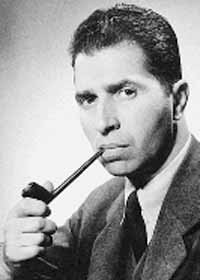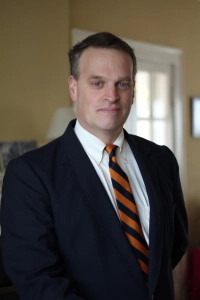As I was searching for a particular statement that Mortimer Adler made somewhere I found an interesting article that he wrote for the University of Chicago Magazine in 1945. I still cannot find the particular thing that he said that I was looking for (it was something to the effect that even though liberal education has suffered a defeat at most colleges and even in secondary schools, it still appears to have a safe haven in the elementary school-of course that was in 1945 and back then there was no “Common Core”), but this particular article gave me a slight jolt because it reminded me just how much I have been influenced by Adler.
You know, one begins to say things for himself without always alluding to mentors and teachers, and then after a while one begins to forget that his own ideas are not necessarily original. I have never really thought my ideas were original, nor do I hope that they are. As a matter of fact a completely original idea should be frightening to any well-educated person in so far as it is given that every significant discovery has its roots in something that came before it. I mean, if one cannot find at least a seed or small suggestion for his “new” idea in Homer or Heraclitus, then my advice would be to back slowly away from it and forget about it forever!
Nonetheless, I did sort of pride myself on being slightly more radical than others in my attempt to spread the gospel of Liberal Education. But now having re-read this article I have been confronted with the stark truth of the matter. Mortimer Adler was the apostle of liberal education (I say “the apostle” of course by antonomasia).
First of all, Dr. Adler thinks that everyone should have a liberal education. He points out that our ancestors were not “democrats” (i.e. children of democracies) and therefore they thought more clearly about education than we do, that is, they understood that liberal education was the best education and therefore is the education for the best.
Adler thinks that they were right in one way and wrong in another. They were right that liberal education is the best education, but they were wrong in reserving it only for the few. Children of democracies should know that what is best for the best, is best for all!
After explaining that “The direct product of liberal education is a good mind” he asserts that liberal education is for everyone in proportion to the capacity of each to receive it.
Anyone who thus understands the point of liberal education should recognize three corollaries. (1) Since every normal being is born with an intelligence that can be disciplined and cultivated—with some degree of capacity for developing a good mind—everyone can be and should be given a liberal education to an extent that equals his capacity. (2) No one can be given a completed liberal education in school, college, or university, for unlike the body, the mind’s capacity for growth does not terminate with youth; on the contrary, the mature mind is more educable than the immature; therefore, adult education must take up where the schools leave off and continue the process through all the years of adult life. (3) Schools and colleges may concern themselves with other goods than a good mind—in a defective society this may be necessary—but if they do, they do so at the expense of time and energy taken away from liberal education.
I agree completely! I am not certain that this should have been included in the Declaration as one of man’s natural rights (e.g. “All men have the right to pursue a liberal education”) only because I would rather insist that it was a human duty to pursue one… not merely a right!
Adler appears to understand that colleges are unfairly burdened with performing a task that is not really their own. That is they have been sidetracked from the principal task of forming good minds to other tasks like preparing students for the myriad careers and vocations that they will eventually pursue. Therefore the bane of education… the elective system!
In truth a liberal education is an education for a lifetime and this what colleges should aim to prepare a student to begin. That is the college commencement should represent a “decent preparation” for a lifetime of learning.
I love Mortimer Adler’s radically clear vision of education as well as his bold proposals for reform. I have emboldened sentiments which might sound familiar to readers of this blog:
The practical suggestions I have to offer as therapy follow from the foregoing diagnosis of the illness of our colleges. We must so reform the curriculum, methods of teaching, and examinations, that we do not mistake the B.A. degree as signifying either a completed liberal education or adequate preparation for earning a living or living a happy life. It should signify only decent preparation for the continuing task of adult education.
A liberal curriculum should, therefore, include no vocational instruction; nor should it permit any subject-matter specialization. In a liberal college there should be no departmental divisions, no electives, no separate course in which grades are given for “covering” a specified amount of “ground,” no textbooks or manuals which set forth what students must memorize to pass true-false examinations. The faculty should comprise teachers all of whom are responsible for understanding and administering the whole curriculum; lectures should be kept to a minimum and they should be of such generality that they can be given to the whole student body without distinction of year; the basic precept of pedagogy should be the direction of the mind by questions and the methods of answering them, not the stuffing of it with answers; oral examinations must be used to separate facile verbalizers and memorizers from those in whom genuine intellectual skills are beginning to develop and whose minds have become hospitable to ideas. No student should be dropped from college because he fails to measure up to an arbitrary standard determined by a percentage of mastery of a subject matter or skill; he should be kept in college as long as he manifests any development of his own capacities, and lack of such evidence should be interpreted as a failure on the part of the college, not the student.
The Apostle of Liberal Education (December 28, 1902 – June 28, 2001)







What do you mean by saying that democracies do not understand liberal education as clearly? I’m not challenging the claim; I just want to understand it. I might be wrong, but didn’t liberal education thrive more or less in the early American universities? Didn’t John Adams write a recommendation letter for John Quincy Adams when the latter was trying to enter college and John Adams said that John Quincy knew how to translate Homer and Virgil, that he had mastered geometry and arithmetic, and that he was familiar with the Greek philosophers and the medieval theologians?
Right well that is true. I guess I would maintain that our nations founders did have a liberal education- but I guess I would hold that they did not grow up in a democracy …or at least that their characters and “mores” were not as saturated with democracy to the extent that one would say that this was their “intellectual custom.”
I think De Tocqueville would agree, although you probably have read his book more recently than I, that as Liberal Education proposes excellence and hierarchy and the pursuit of “truth for its own sake,” Democracy appears to bestow a hunger and disposition for “equality.” I think this is one of the reasons why Adler thinks that “democrats” are not able to think as clearly about education as our ancestors.
Although Adler appears to be a lover of Democracy insofar as it would appear to propose that all men be given an opportunity to fulfill their nature, and not just the few, I am not sure that he would agree that Democracy necessarily disposes men towards a love of equality like Tocqueville seems to imply- but Adler does seem to agree that among the various factors that explain why our contemporaries cannot think clearly about education is the fact that our contemporaries are “democrats.” (He proposes two other reasons as well which you may see from the link)